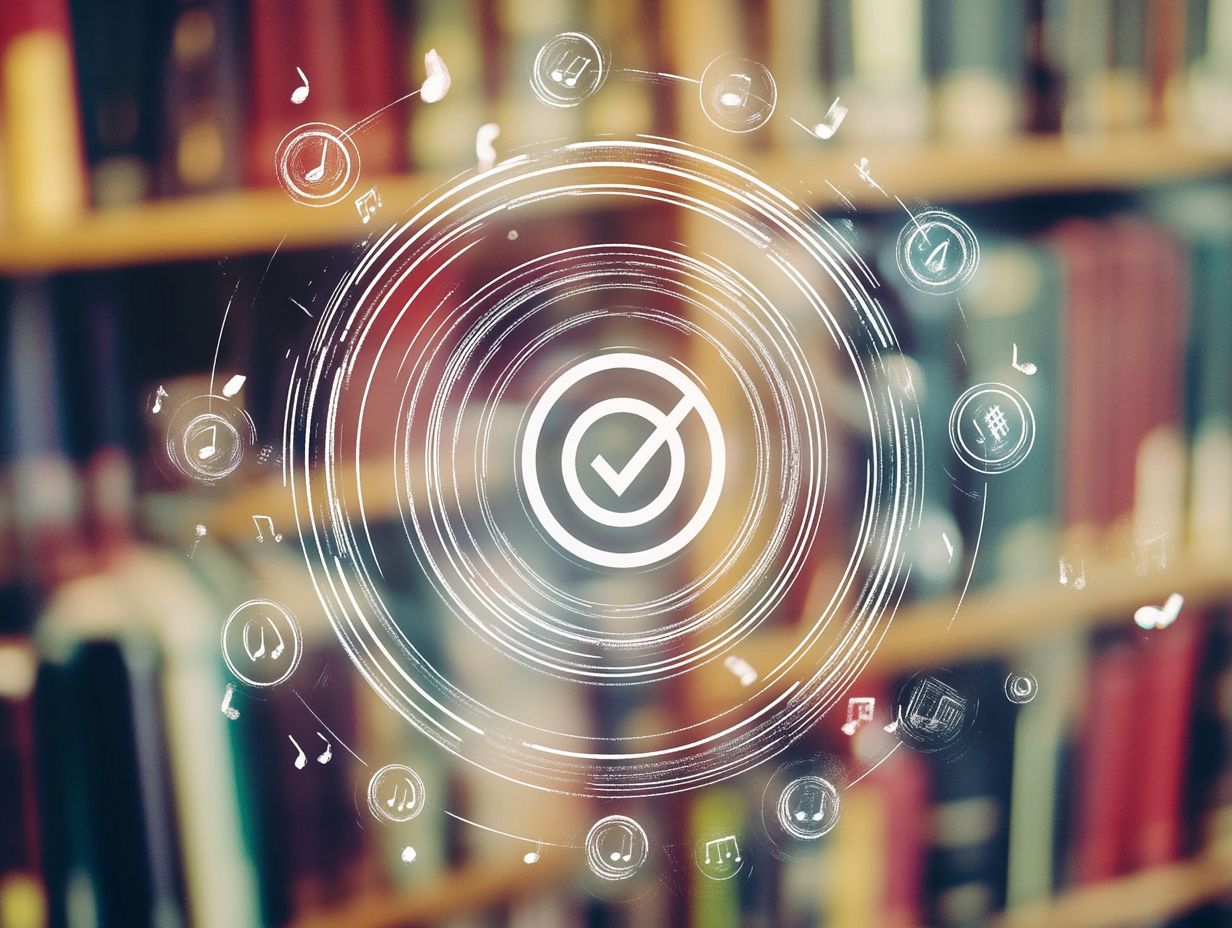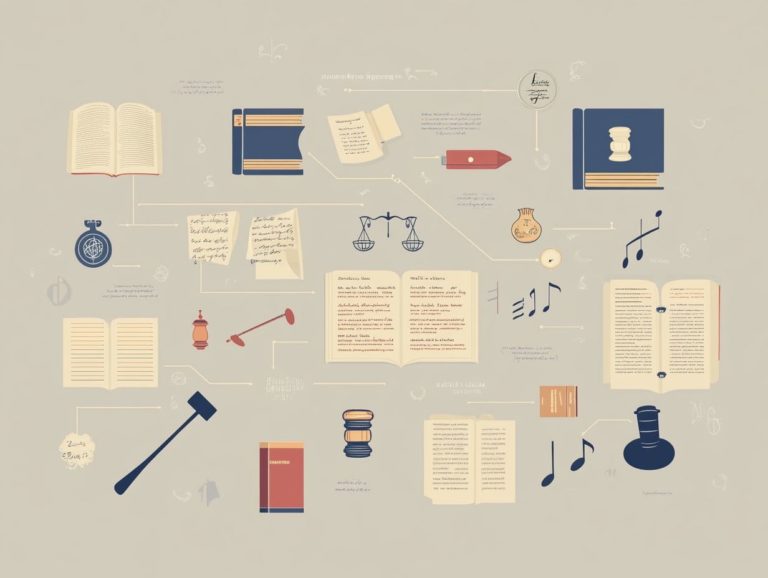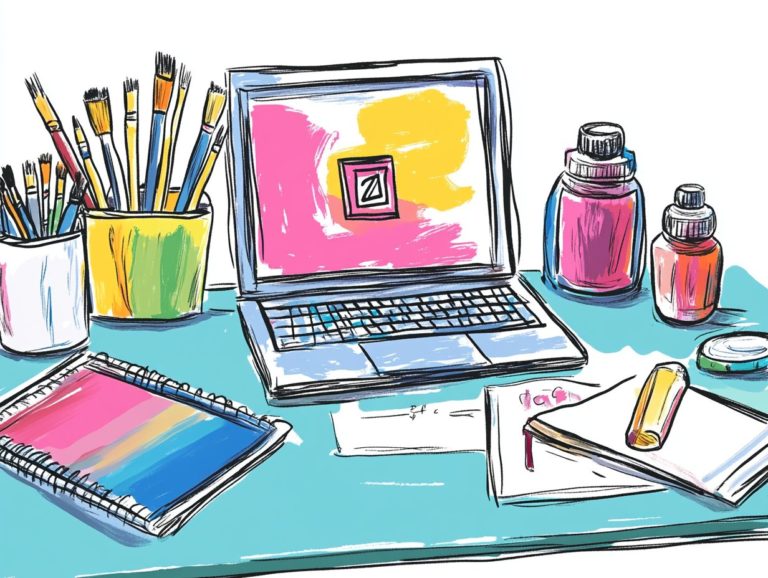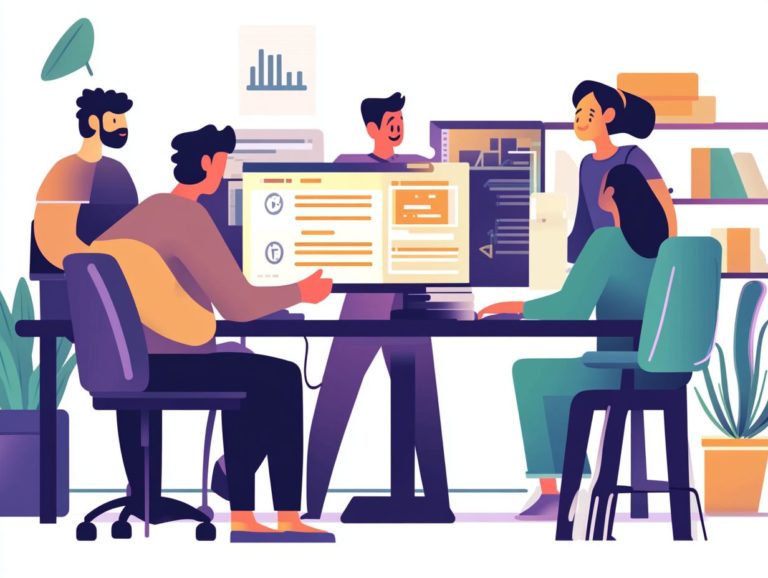5 Common Copyright Mistakes to Avoid
Navigating the complexities of copyright can be quite the challenge, especially for creators eager to showcase their work. Missteps in this realm can lead to significant legal repercussions, yet many find themselves caught in common traps.
Let’s explore five common copyright mistakes you must avoid! This article covers the use of copyrighted material without securing permission, overlooking the registration of your own copyrights, and the very important need to understand copyright laws. It also highlights how to protect your creations and dispels several widely held myths.
Act now to protect your creativity and avoid costly mistakes!
Contents
Key Takeaways:

- Always obtain permission before using copyrighted material.
- Give proper credit to the original creator.
- Understand the laws of fair use before assuming it applies.
- Register your copyrights to protect your work.
- Keep track of expiration dates to avoid infringement.
- Understanding copyright is crucial to avoid legal consequences and protecting your work.
- Different types of copyright include literary, musical, and artistic works.
- Copyright can be protected through registration, licensing, and copyright notices.
- Infringing on someone’s copyright can result in fines, penalties, and legal action.
- Avoid infringement by educating yourself on copyright laws and obtaining permission before using others’ work.
- Common myths about copyright include the belief that giving credit is enough or that everything on the internet is free to use.
1. Using Copyrighted Material without Permission
Using copyrighted material without permission is among the gravest copyright mistakes you can make. It can lead to severe penalties, including financial claims and damages that could significantly impact small businesses and creative professionals. This highlights the importance of understanding copyright law and recognizing the rights of content owners. To deepen your knowledge, explore 5 uncommon copyright cases you should know in today’s digital landscape.
Copyrighted material isn t just limited to text; it also includes many forms such as images, music, videos, and software. Each has its own rules about how you can use someone else’s work. Overlooking these rules can result in serious repercussions, from hefty fines to the forced removal of infringing content.
For instance, using an unlicensed photograph or background score without the appropriate permissions may lead to legal actions that drain financial resources and tarnish your reputation.
It s essential for both creators and businesses to familiarize themselves with licensing agreements and seek proper authorization before using protected content. This proactive approach will safeguard your creative endeavors and demonstrate respect for the rights of original creators.
2. Not Giving Proper Credit
Not giving proper credit is an oversight you certainly want to avoid. It can lead to copyright issues that undermine the rights of original artists, making it crucial to understand the 5 key considerations for copyright licensing, resulting in claims from content owners eager to protect their creative expression.
In today’s digital landscape, where content is swiftly shared across various platforms, the importance of attribution cannot be overstated. Failing to acknowledge the original source of your inspiration whether it s a photograph, musical composition, or written piece exposes you to potential legal troubles and undermines respect for your fellow creators.
Best practices for recognizing creators can differ depending on the context. In academic writing, precise citations are crucial, while on social media, tagging and shout-outs can be powerful tools.
By ensuring that all contributions are properly credited, you cultivate an atmosphere of mutual respect and encouragement, actively supporting the vibrant community of creativity that we all benefit from.
3. Assuming Fair Use without Understanding the Law

Assuming Fair Use without a solid grasp of copyright law is a common pitfall. This mistake could land small businesses and creative professionals in hot water. To avoid such issues, it’s important to consider essential copyright tips for new authors, as it often stems from a misunderstanding of the intricate rules surrounding the permissible use of copyrighted material.
Fair Use allows you to utilize limited portions of copyrighted works under specific conditions. It lets you incorporate snippets for commentary, criticism, news reporting, research, and teaching.
- For example, a teacher might pull a section from a textbook to illustrate a point during a lesson.
- A reviewer may quote a few lines of a song to provide context in their critique.
It’s essential to differentiate Fair Use from public domain, where works aren t protected by copyright and can be freely used. This distinction is critical. Seeking legal counsel can guide you through these complexities, ensuring that you remain compliant while safeguarding your creative interests.
4. Neglecting to Register Copyrights
Neglecting to register copyrights can significantly limit your protection for creative works. This oversight leaves you susceptible to infringement and makes it harder for you to enforce your intellectual property rights. To navigate these challenges effectively, be aware of the pitfalls in IP litigation that you should avoid.
Establishing formal copyright registration not only strengthens these protections but also gives you the power to take legal action in cases of infringement. The process is typically straightforward: submit an application to the appropriate copyright office, provide the necessary details about your work, and pay a modest fee.
Once your work is registered, you’ll enjoy numerous advantages:
- The right to sue for financial compensation set by law.
- The ability to claim attorney’s fees, which can be crucial in litigation.
- A registered copyright deters potential infringers, signaling the seriousness and legitimacy of your claim.
Unauthorized use can lead to legal consequences, making registration essential for protecting your creative output.
5. Not Keeping Track of Copyright Expiration
Failing to keep track of copyright expiration dates can waste your hard work. When copyrights expire, your valuable content may slip into the public domain, which can lead to others using it without your permission. To avoid misconceptions, it’s important to understand 5 myths about copyright registration that could even land you in financial trouble.
To sidestep these pitfalls, it’s imperative to implement effective strategies for monitoring those crucial dates. Utilizing tools like copyright management software or setting calendar reminders can help you keep an eye on expiration timelines.
Staying informed about relevant laws will equip you with the knowledge needed to navigate changing regulations. Without tracking expiration, you risk losing your work forever!
The implications of losing copyright protection are substantial. Unauthorized use can dilute your brand and lead to missed revenue opportunities, making proactive management essential for safeguarding your ownership and ensuring your financial stability.
What Is Copyright and Why Is It Important to Understand?

Copyright protects your rights as a creator over your original works. It s essential for you as a small business owner or content creator to grasp how it operates and what it means for your intellectual property.
This legal protection allows you to enjoy the fruits of your labor by granting you exclusive rights to reproduce, distribute, and display your creations.
By safeguarding your artistic, literary, and intellectual expressions, copyright law fosters a vibrant marketplace where innovation flourishes and originality is celebrated. The importance of these protections is profound; without them, you risk having your work copied or exploited without your permission.
Infringement can lead to serious repercussions, including legal action and financial penalties. Are you protecting your creative work? It s essential to respect copyright laws in all your creative endeavors.
What Are the Different Types of Copyright?
Knowing the types of copyright is crucial for content owners and creators. It helps you determine the right licensing and protections for your creative works, whether in music, literature, or visual arts.
Registered copyrights provide legal confirmation of ownership. They are essential if you need to enforce your rights in case someone infringes on your work.
There are rights that ensure you get paid when your music is played publicly. This means you, as an artist or composer, receive compensation when your works are performed live or broadcasted.
Licenses that let venues play many songs for one fee come into play for businesses and venues. This simplifies things for those who want to feature a variety of songs without the hassle of securing rights for each one.
Each type of copyright serves distinct purposes based on the nature of your creative work and the specific rights involved. It’s vital to grasp the processes related to obtaining them.
How Can One Protect Their Copyright?
Protecting your copyright requires strategic planning and understanding the rights of license holders. Get legal help to navigate copyright law easily.
You can also register your works with the appropriate copyright office to solidify your claims and gain additional legal protections. Licensing agreements empower you to control and monetize your work, allowing you to set specific terms for its use.
Actively monitoring how your creative works are used across different platforms can help you identify any unauthorized usage or infringements. Given the nuances of copyright, consulting with legal professionals will provide tailored guidance, ensuring you can protect your rights and interests effectively.
What Are the Consequences of Copyright Infringement?

The consequences of copyright infringement can be severe, ranging from hefty financial penalties and claims for damages money that must be paid to the injured party to a significant loss of credibility for individuals and businesses found in violation of copyright law.
Take, for instance, the case of Capitol Records v. Thomas-Rasset, where the plaintiff was hit with a staggering $1.92 million in damages for illegally downloading and distributing 24 songs. This serves as a powerful cautionary tale, underscoring not only the immediate financial repercussions but also the enduring reputational damage that can ensue.
Understanding these legal ramifications should motivate you to respect copyright laws! Cultivating an appreciation for original work fosters a more ethical creative environment. By recognizing the risks involved, you may think twice before engaging in unauthorized usage, ultimately nurturing a culture of compliance and respect for intellectual property.
How Can One Avoid Copyright Infringement?
Avoiding copyright infringement demands diligence, including obtaining the necessary clearances and permissions, understanding licensing processes, and being vigilant about common copyright missteps. To navigate this complex landscape, it’s helpful to explore essential copyright questions answered that could jeopardize your creative works.
A proactive approach requires you to thoroughly educate yourself about copyright law, as it can vary significantly depending on your jurisdiction. Familiarizing yourself with the nuances of fair use and the importance of citing sources is essential.
Seeking permissions from rights holders not only safeguards your work but also ensures it’s used legally. Utilizing licensed content, like stock images or royalty-free music, can further mitigate potential risks.
Consulting with legal professionals who specialize in intellectual property offers invaluable guidance. This enables you to navigate complex situations with confidence and empowers you to protect your creative endeavors effectively.
Start learning about copyright today to protect your creative work!
What Are the Most Common Myths About Copyright?
Many people have wrong ideas about copyright, which can lead to mistakes that hurt both creativity and the rights of content creators. To avoid these pitfalls, consider exploring 5 ways to avoid copyright issues on social media.
One common mistake is thinking all uses of copyrighted material fall under Fair Use. This misconception can lead creators to believe they can use someone else’s work without permission, which is why understanding tips for protecting your copyrighted work is crucial.
Another misconception is that registering a work guarantees all rights. In reality, copyright exists the moment a work is created.
For anyone involved in creative work, getting accurate information is crucial. This helps protect your work while respecting others’ rights.
Frequently Asked Questions
- What are the 5 common copyright mistakes to avoid? Using copyrighted material without permission, not attributing the source, assuming everything online is free, neglecting to register your original work, and misunderstanding copyright duration.
- What happens if I use copyrighted material without permission? You may face legal issues, including lawsuits or fines.
- How can I properly attribute the source of copyrighted material? Include the copyright owner’s name, the work’s title, and the publication date. Always get permission before using someone else’s work.
- Is everything on the internet free to use? No, many online resources have terms that require permission or payment.
- Why is it important to register my original work? Registration provides legal protection and proof of ownership, making it easier to defend your rights.
- How long does copyright protection last? It usually lasts for the creator’s life plus a specific number of years after their death.
Don’t wait to protect your creativity learn about copyright today!






